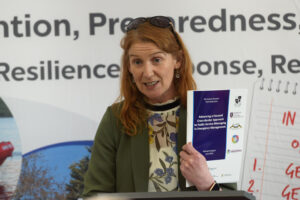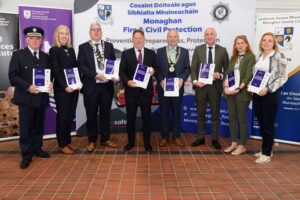A Research Report has been launched titled:
All-Ireland Disaster Risk Reduction
Advancing a Focused Cross-Border Approach to Public Service Messaging in Emergency Management.


Fermanagh & Omagh District Council Chief Executive Alison McCullough, Fermanagh & Omagh District Council Chairperson John McClaughry,
Darragh O’Brien, Minister for Housing, Local Government and Heritage of Ireland, Cllr David Maxwell, Cathaoirleach, Monaghan County Council, Robert Burns, Chief Executive, Monaghan County Council, Caroline Creamer, International Center for Local & Regional Development and Joan McCaffrey, Cross Border Emergency Management Group, at the launch of the Shared Island Report “Advancing A Focused Cross-Border Approach to Public Service Messaging in Emergency Management”.
Public safety messaging on the island of Ireland requires proactive cross-border coordination among public authorities at strategic and operational levels, according to a new report by researchers at Maynooth University.
The report, Advancing a Focused Cross-Border Approach to Public Service Messaging in Emergency Management, was presented by MU’s International Centre for Local and Regional Development (ICLRD) and launched by Minister for Housing, Local Government and Heritage, Darragh O’Brien, in Clones Fire Station, Co Monaghan.
The research team included Dr Cormac Walsh, a senior research associate with the ICLRD along with ICLRD director Caroline Creamer of MU’s Social Sciences Institute (MUSSI) and Innovation Value Institute (IVI), Dr Tadhg MacIntyre of the Department of Psychology, Dr Brendan Keegan of MU’s School of Business and Dr Adrienne McCann.
The study was an initiative of Monaghan County Council, a member of the Cross Border Emergency Management Group (CBEMG), collaborating directly with colleagues in Northern Ireland, including Fermanagh and Omagh District Councils. County Monaghan is in a unique geographical position as it shares the border with three counties and four district councils and has almost 100 of the 270 crossings with Northern Ireland.
The research, which draws from two cases studies in the towns of Clones, Co Monaghan and Lisnaskea, Co Fermanagh, found that public safety messaging is not only about providing information to the public. “It is fundamentally about community engagement and providing effective empathic leadership in times of crisis,” the report says.
It recommended that public safety messaging be universal, incorporating both analogue and digital means, and reach all sections of society, including the elderly, people with disabilities and people for whom English is not their first language.
According to Caroline Creamer, MU-based Director of the ICLRD: “Cross-border regions face specific challenges in emergency management – from infrastructural deficits, poor mobile phone coverage, and an over-reliance on commercial social media platforms to disseminate messaging to all sections of society.”
“While one would expect that the task of communicating key messages or warnings to the public in cases of emergency would have become easier with more advanced communication technologies, this has not been the case. Rather, public safety messaging must compete for attention in an increasingly crowded media landscape. Clear, timely and effective communication is essential to emergency management and disaster risk reduction – whether at the scale of a national emergency or a localised incident.”
The report says that international experience indicates that location-based SMS at a local level can complement a national cell broadcast system, while a dedicated telephone line should be established to provide local and regionally specific information on current incidents and risks in accessible language.
It also noted that effective emergency management communication is dependent on the ability of citizens to reliably contact the emergency services by telephone from their home or place of work. It said public investment is required to improve mobile phone network coverage in the cross-border region.
It recommends that local authorities should consider producing a joint preparedness brochure or booklet with key contact information for emergency response agencies, for distribution to community organisations. “The booklet should provide information on potential risks in the cross-border region, where relevant, referencing past events (e.g., flooding, wildfires).”
Where a severe weather alert is issued in either Northern Ireland or the Republic or both, the Cross Border Emergency Management Group should issue joint guidance specific to the cross-border region, providing clarity and reducing the potential for confusion or complacency, the report recommends. In the case of prolonged incidents, such as pandemic or prolonged flood incidents, procedures should be introduced to ensure public safety messaging in each jurisdiction is kept as consistent as possible, it says.
The report also suggests that multi-organisational demonstration and contingency scenario exercises, organised on a cross-border basis, can be an effective means of preparing for potential cross-border incidents and demonstrating to the public that the capacity for an effective cross-border response exists and can be called upon.
“Monaghan County Council, as a member of the CBEMG, welcomed the opportunity to lead this research study and collaborate directly with our colleagues in Northern Ireland. The study afforded an opportunity to engage directly with statutory agencies and community groups on both sides of the border via focus group sessions to obtain a qualitative overview of current practice,” MCC Chief Fire Officer Dermot Brannigan said.
Robert Burns, Monaghan County Council Chief Executive, welcomed the report: “A whole of society approach to communication is a critical task of responding agencies’ during emergency incidents, and more so now in an era of changing methods of communication. Embracing technological both change and progress, while also ensuring a trusted narrative will form the basis of all our future plans.”
you can download the report in PDF format here:
